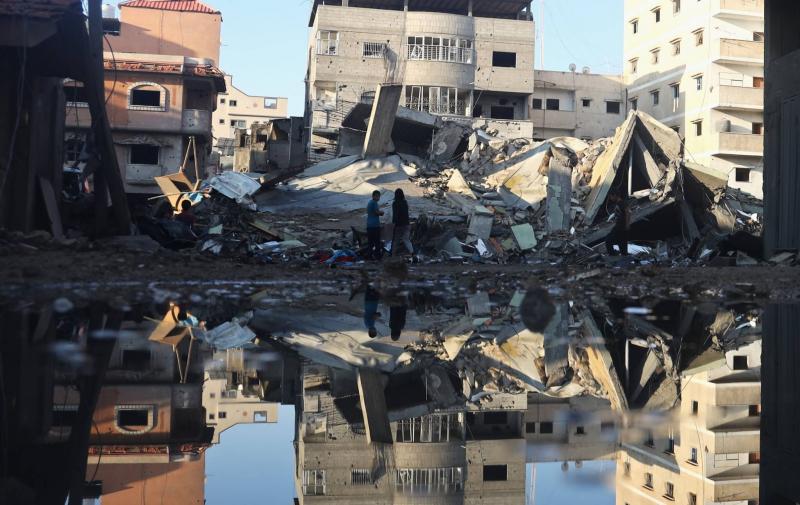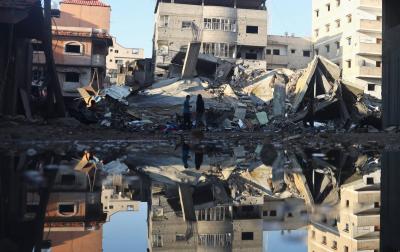Between Hamas's attack on October 7 of last year and Israel's brutal and indiscriminate response in Gaza lie political challenges with implications that extend not only to the policies of the Middle East but to the entire world. The effects left by this war, which is nearing its first anniversary, are extensive to the point that the crisis appears to be heading towards continuation without pause. The United States is the only country in the world that interacts with all parties in this issue, particularly serving Israel primarily. This inclination has led to the emergence of American policy, deeply entangled in a volatile region tossed by groups all vying for contention regardless of the arena of conflict and its nature. American policy claims to be preparing for competition with major powers like China and Russia, yet simultaneously shocks the world with America's setbacks in the Middle East. Instead of decreasing U.S. involvement in the region as the Biden administration sought, America today finds itself leaning towards a newly complex model of political interventions. Developments in the Middle East, whether in favor of Israel or against it, have the greatest impact on U.S. policy. In the Gaza Strip, there is a direct war with militants, but at the same time, there are Israeli practices that fall into the realm of genocide and war crimes, which the entire world has condemned. The International Court of Justice has intervened to expose these practices and condemn the perpetrators.
What will Israel do concerning the Gaza Strip and what does it want? No Israeli officials have been able to discuss this fundamental question. Is the re-occupation of the territory one of the unspoken options, or is the truth that Israel is entangled and unable to decisively determine the battle's outcome in any direction? The effects of the war on Israel are significant, and its continuation will not bring victory to Israel. The world is actively seeking a lasting answer to how stability can be achieved in Gaza. However, it is clear that the conditions for this stability are multiply complex on both sides involved in the fight.
What is being proposed politically is the search for a realistic plan that can provide Gaza's residents with the incentive to live in peace, in exchange for Israel achieving permanent stability and security in Gaza. This is a natural demand, but the process of reaching it is complicated and difficult. Peace in Gaza will not occur unless it traverses a bridge of complete peace with the Palestinians as a wide authority that encompasses everyone present on the ground. The missed opportunities in this war are numerous, and humanitarian efforts alone cannot cover the political void in finding solutions. There is a clear political failure in which Israel plays a significant role by trying to avoid the idea of defeat. It is indeed suffering from the war in Gaza, and it understands the potential risks of continuing the conflict, which remains an open option for the other party in the Gaza equation.
Today's challenges lie in the escalation behavior that Israel can exercise and extending the war beyond its borders. Therefore, any Israeli or American strategy to expand the competitive scope or attempt to mitigate the impacts of the conflict zone in Gaza through external proliferation would be a strategic disaster for the region. After this duration of war, the world has discovered that the fundamental ideas for which the war was initiated are gradually disappearing and being replaced by new challenges. There are humanitarian issues, allegations of war crimes, international trials, and incapacity to exit the battlefield, especially for the Israeli side, alongside a significant rise in the idea of Palestinian rights and its independence for a state with a clear geographical framework.
The results of the Gaza war are broader than its fundamental topic for which it was instigated. The Palestinian issue is an idea buried under any bullet fired over Palestinian soil or any political statement or Western support or international dialogue or bilateral discussions. The impacts left by the Gaza war will not be discarded; rather, it represents a new project that re-arranges the issue according to updated priorities. For these reasons, indicators do not seem positive regarding a quick end to the war, particularly in the coming months. The possibility of its continuation is high until the U.S. elections reach their final station at the beginning of next year.
It has become difficult for Israel to apply its ideal concepts and solutions to the reality in Gaza. Any Israeli thinking regarding Gaza's future has become complex, and the details of Israeli steps are now linked to regional and international partners. Israel will not be able to push through its ideas as its visions for Gaza's future are far from reality unless there are options that compel Israel to pay a reasonable political price that can achieve actual stability. Otherwise, the options for conflict will continue, as Palestinian history indicates.




